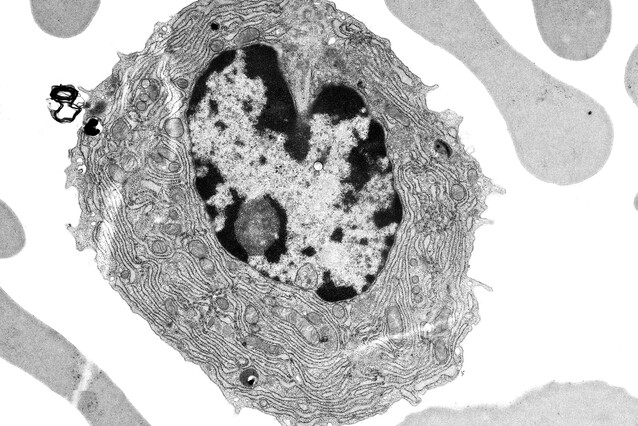Avoiding the flood: how plasma cells constrain antibody secretion

Plasma cells are the antibody factory of our immune system: they secrete vast quantities of highly specialised antibodies to counter an infection. Scientists in the lab of Meinrad Busslinger have uncovered one of the mechanisms underlying the regulation of antibody secretion: the protein Mist1 quells secretion to healthy levels and promotes the viability of plasma cells. Their study is now published in the journal Frontiers in Immunology.
B cells can follow several trajectories of differentiation to respond to a pathogen’s attack. Their final and most effective differentiation stage to tackle them is to become a plasma cell. These white blood cells secrete large quantities of antibodies in response to the detection of a foreign particle. The antibodies then contribute to neutralising the threat.
As plasma cells develop and upscale their antibody production, they increase in size and accumulate unfolded proteins such as antibodies. If this accumulation is not regulated, it can lead to premature cell death. To avoid this outcome, some molecules in plasma cells take part in the ‘unfolded protein response’: they ensure that the accumulating antibodies are properly folded and secreted.
The transcription factor Xbp1 is one of several proteins that regulate this response through the activation and inhibition of an array of target genes. While immunologists have shown that Xbp1 is essential for cells to secrete antibodies, they had not pinpointed the roles of its targets.
Scientists in the lab of Meinrad Busslinger have investigated the function of one of these targets, called Mist1 – a protein whose expression increases with Xbp1 activity. Miriam Wöhner, co-first author, started the project. She expected that depleting Xbp1 or Mist1 would have the same effect on plasma cells, but her experiments led to a surprising result.
“When we remove Xbp1 from the picture, plasma cells fail to reach a normal level of antibody secretion. But when we remove Mist1, the trend is the opposite: plasma cells secrete more antibodies than they should, and have a higher mortality,” Wöhner says.
“Xbp1 and Mist1 are in the same regulatory network of proteins, but they have different effects on plasma cells,” explains Theresa Pinter, PhD student and co-first author. “Our experiments show that, in a normal plasma cell, Mist1 represses antibody secretion to keep it at a healthy level.”
Other researchers had investigated the role of Mist1, but they had only done their experiments in vitro or on a smaller scale, missing crucial elements of the bigger picture. Wöhner and Pinter’s results from in vivo experiments shine a new light on the role of Mist1 in antibody secretion.
The next step in their investigation was to understand how Mist1 can exert its inhibitory role. Mist1 regulates the activity of other proteins, including Blimp1, which is essential for plasma cell development and also regulates the secretion of antibodies.
Through further experiments in mice, the team found that Mist1’s absence results in an increase in Blimp1 levels in plasma cells. This in turn leads to an overproduction of secreted antibodies and lowers cell survival.
“To confirm our findings, we artificially cut in half the concentration of Blimp1 in these cells, and we expected it to restore a healthy phenotype. Normal cells have two copies of the gene that encodes Blimp1 – we tampered with one of them by attaching the Green Fluorescent Protein gene to it. The Blimp1-GFP DNA sequence leads to the formation of a dysfunctional protein,” Pinter says. The results were clear: reducing Blimp1 to its normal levels balanced out the negative effects of Mist1’s absence.
The study, now published in Frontiers in Immunology, adds a new piece to the puzzle of antibody secretion: in a normal cell, Mist1 represses Blimp1, thereby downregulating antibody secretion and promoting the viability of plasma cells.
Original publication
Miriam Wöhner*, Theresa Pinter*, Peter Bönelt, Astrid Hagelkruys, Daniela Kostanova-Poliakova, Johannes Stadlmann, Stephen F. Konieczny, Maria Fischer, Markus Jaritz and Meinrad Busslinger: “The Xbp1-regulated transcription factor Mist1 restricts antibody secretion by restraining Blimp1 expression in plasma cells”. Frontiers in Immunology (2022), DOI: 10.3389/fimmu.2022.859598.
*These authors contributed equally to this work.
Further reading
IMP student identifies new drivers of plasmablast development
The Vienna BioCenter PhD Program
Immunology at the IMP